Wildlife Veterinary Internship in Kruger National Park, South Africa
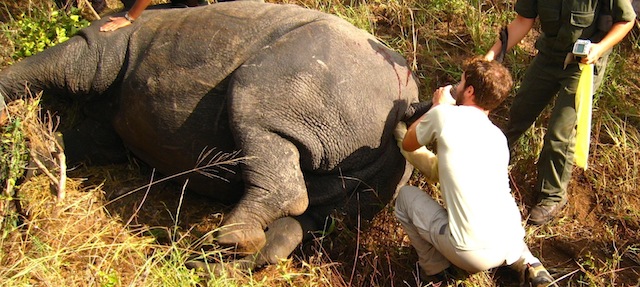
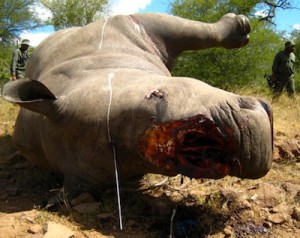 He remembered the two dead rhinoceroses in Kruger National Park, poached overnight for their precious horns and left to rot in the searing South African sun that rose the next morning. It was the first day of a two-week internship during his last year of vet school, and he had a nasty case of travelers’ diarrhea. Thank you, Johannesburg street vendor, but that brai was definitely worth it.
He remembered the two dead rhinoceroses in Kruger National Park, poached overnight for their precious horns and left to rot in the searing South African sun that rose the next morning. It was the first day of a two-week internship during his last year of vet school, and he had a nasty case of travelers’ diarrhea. Thank you, Johannesburg street vendor, but that brai was definitely worth it.
Forensic investigations can’t wait for a vet student with a weak constitution, however. So he jumped in a Land Cruiser with the rest of the team and bumped along twenty miles of backcountry safari track, just hoping he wasn’t going to be sick and ruin an otherwise commendable first impression with his veterinary idols.
At about fifty yards out from the rhinos, a giant cloud of scavenging vultures lifted off the carcasses and sent a wafting aroma that hit him just at the point where he couldn’t hold it in any longer…
————
And that was just the first day! I actually pulled this account straight from my novel-in-progress. Don’t worry, though, that’s one of the very few autobiographical bits I’ve thrown into my hero’s life story. I haven’t had nearly the excitement in my life (yet?) to make it in a good science thriller! James Herriot meets Michael Crichton meets Tom Clancy, coming your way sometime next year…
But back to the subject at hand. I spent two weeks working with the Veterinary Wildlife Services team in Kruger National Park through their veterinary student elective clinic program.
This was way back in the spring of 2008, but I’ve checked in with a few students who have done the externship more recently to make sure that my information is up to date. I also just got off the phone with the new administrator of the program, and she e-mailed me the current student information packet. You’ll find that linked below.
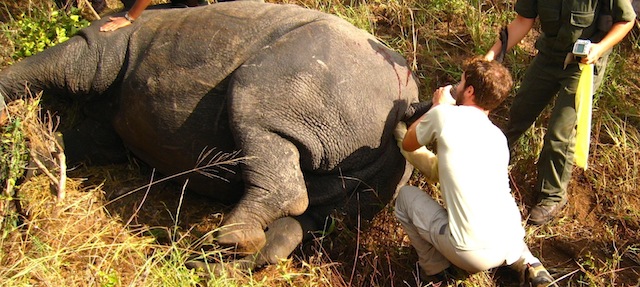
Daily Activities During the Externship
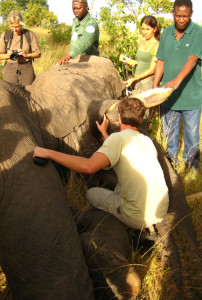
So besides getting sick in the bush and assisting with field necropsies of rhinos, what did I actually do on a daily basis?
I was fortunate that during my externship, the Veterinary Wildlife Services team was hosting a three-day training for veterinarians from other countries in southern Africa. There were about ten other young vets participating, from Mozambique, Botswana, Zimbabwe, and Zambia.
South Africa is pretty unique in the region in that it has enough money and trained professionals to maintain a really top-notch national park system, including highly developed veterinary and research programs. This means that they are in a great position to provide training to visitors from neighboring countries, and that’s why this particular training event was happening.
The training meant that they had saved up a few jobs specifically to do during those three days, including the immobilization and transportation of several live rhino and radio-collaring of a huge bull elephant. I was lucky to be able to ride in the helicopter a few times, and those were some of the coolest experiences of my life.
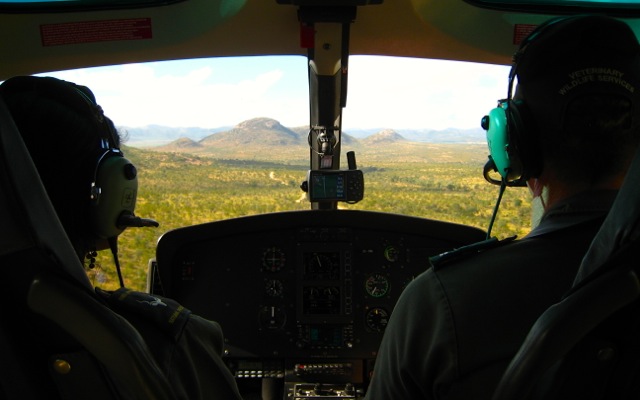
Tourists pay hundreds of dollars for a helicopter ride to see African wildlife, and here I was doing the real thing, basically for free! The photo below (which is also on my homepage) was taken during one of our early morning rides.
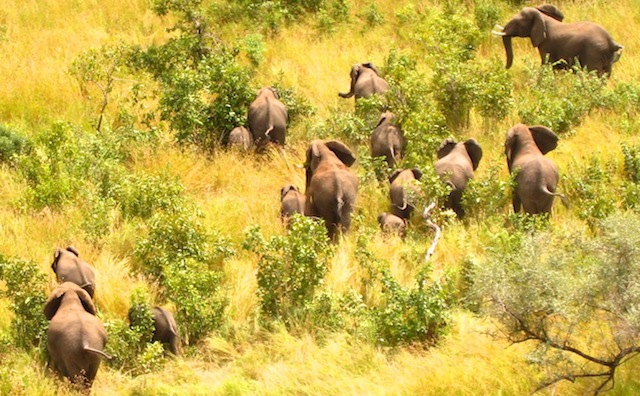
I loved hanging out with these other veterinarians and made some friends that I continue to stay in contact with.
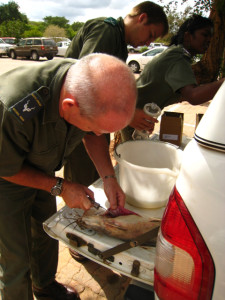
Apart from this training, we were called out to investigate several other animal deaths that were suspicious for one reason or another. The goal of the veterinary team is not to try to save every animal from dying a natural death. They typically only intervene in a case of extreme suffering or when further diagnostics and investigation might contribute to our understanding of disease processes and toxicology in these animals.
One of the important things to realize is that as a vet student with South African National Parks, you are really just there to soak it all in and help out with whatever happens to be going on. They’re probably not going to plan any particular activities just because you are visiting during a given two-week period.
This means that you might be really busy with game captures and necropsies for a few days, and then have nothing going on at all for the rest of your externship. Or you might be flying around in helicopters and darting elephants every day! It really just depends on what is going on, and there’s no way to predict that ahead of time.
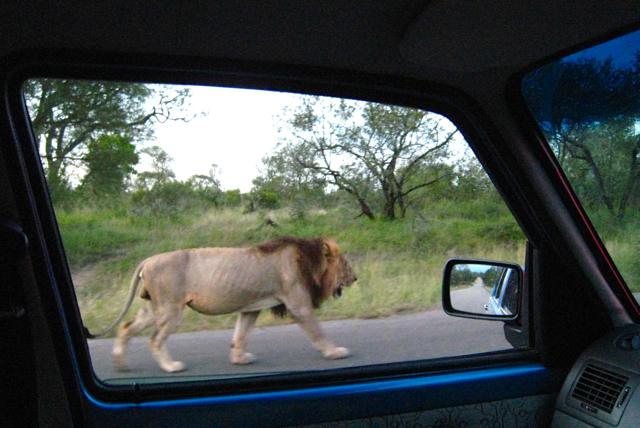
I honestly didn’t mind the down time. On the few days when there was no field work to take care of, the veterinarians gave me a choice. I could hang out at the office with them, reading up on some of their books, looking through their pharmacy, etc. Or I could just take my rental car out into the park and explore on my own.
Can you guess which option I chose? Kruger is the nicest national park I’ve been to in Africa, so exploring it on my own in a rental car was both incredibly easy and tremendously fun. The roads are well-maintained and well-marked. There are restaurants and rest areas scattered at convenient locations throughout the park. And there are animals everywhere!
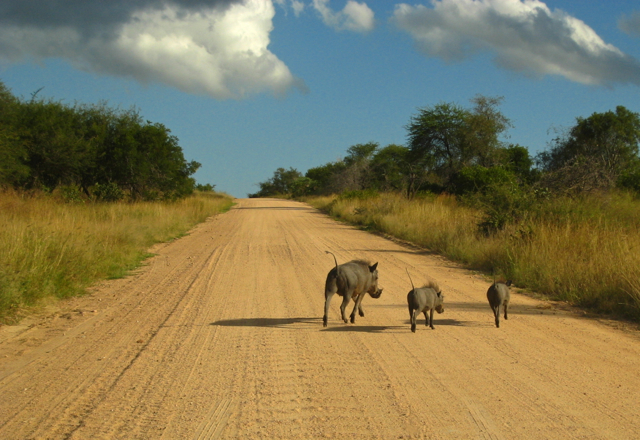
All the Necessary Details
I mentioned in another article about wildlife training in South Africa that I am a little bit suspicious of veterinary programs that require a fee of thousands of dollars for a more sanitized and packaged experience. I understand that there is place for these programs, and they probably do provide a great introduction for the students who are able to afford them.
However, my experience at Kruger taught me that it’s not necessary to use your life savings (or student loan excesses, as the case may be) in order to get this introduction to wildlife veterinary work in Africa.
I was able to use frequent flyer miles to get a free round-trip ticket to Johannesburg. If you’re interested in learning more about building up those miles yourself, I’ve learned a lot from Chris Guillebeau’s Travel Hacking programs.
I did have to pay for a rental car for the two-week period. At the time I’m writing this (November 2013), a two-week economy rental car from the international airport in Johannesburg was about $200 total.
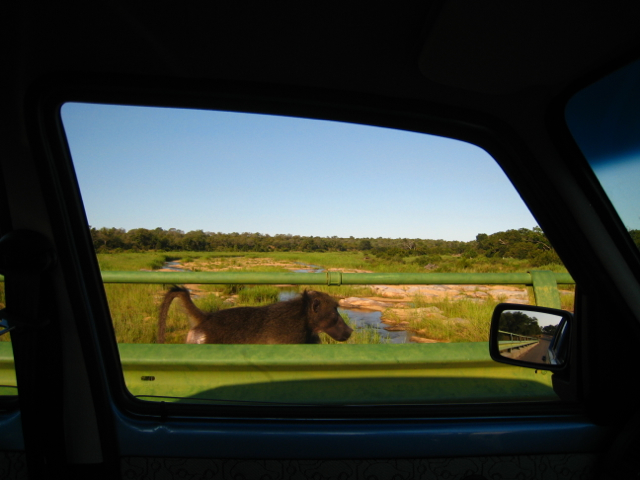
Students are also responsible for paying for their own food during the externship. This was easy: I got groceries a couple of times and spent maybe $100 over the two weeks.
But here’s the best part: the actual cost to participate, which includes accommodation inside the park, is about $100 per week. I say “about” because they give the cost as 1000 South African Rand, so it’s subject to exchange rate fluctuations.
The accommodation is in a little compound just across from the veterinary office, and it is used by both the student externs and other visiting researchers. It includes a basic but comfortable room with shared bathrooms and kitchen. I had a great time hanging out in the evenings around the open firepit/grill, enjoying good wine and conversation with the other visitors.
The student elective program is only open during the game capture season from March to September every year. Students are allowed to stay for a maximum of two weeks, and there are no more than 2-3 students selected during any given time slot to maximize the benefits of the experience. I just heard from the program administrator that they have not yet begun making a schedule for the 2014 season, so get your applications in now!
Here is the full information packet (a PDF) with even more detailed information. Be careful not to e-mail the person listed on the SANParks website (she’s moved on to another job), but use the one in this updated document instead.
Do you have any questions about my experience at Kruger?
Can you recommend similar opportunities to get wildlife veterinary training?
Please let me know in the comments below!

Comments
This is so cool! I did a study abroad trip for wildlife management before my Junior year in South Africa, and I loved Kruger. Definitely will have to keep this in mind for when I finally reach VM-4! Thank you!
I would love to get back there myself — it’s the kind of place that people like us could happily spend years exploring!
This looks incredible and it seems to be the “real” deal. I’m studying to be a veterinary nurse and I’m wondering if anyone has had any experiences similar to this as a vet nurse? Thank you.
Pretty cool stuff Elliott! I have never done any of these externships that requiere paying for it because I dont have the money to afford it but with these few tips it does sound tempting! What about shadowing a wildlife vet? Like just the vet and yourself, obviously, a vet that is willing to do such a thing… That is my plan for 2015, by then I will have enough miles for a roundtrip flight from Dominican Republic! 🙂
Karla, you’re right that shadowing an individual vet through an arrangement you have developed on your own is probably the most cost-effective way to go. I was supposed to do this with the Oregon state wildlife veterinarian but ended up missing out due to a scheduling conflict.
That looks really nice and quite cheap for such an experience! I actually worked with a wildlife vet in South africa this sumer, but with farmers all around and not in the parks, and if anyone is interested we started a 2 weeks program for vet students and vet tech student too! I have to admit that it is more expensive then the trip in Kruger but we have some stable activities in the program, like helicopter time and a really great book on wild african animals with drugs dosages in it and a good pharmacology reminder! You can check out our Facebook page: https://www.facebook.com/motsumiexperience?ref=ts&fref=ts
Sounds like a fun experience, Audrey, thank you for telling us about it!
I’ll add another vote of support for the experience. I went a few years after you. When I was there, we had 1-3 rhino captures per day, plus 3 elephants and a leopard. There’s huge variety from one rotation to the next though – the group before mine spent several nights doing lion captures with limited other work during their time, while the next group was going to be involved in several days of mass zebra capture. Definitely the highlight of my vet school experience and like Elliot I was able to do it extremely inexpensively due to being able to score a frequent flyer ticket.
Awesome photos, Lauren! Thanks for sharing about your experience at Kruger — that affirms what I’ve heard from a lot of other students as well.
I’m a sophomore in high school and I am really interested in having a career as a wildlife veterinarian. What did you have to do to get to what you are doing now? Was it difficult?
Arianna, thanks for your comment. It’s definitely a long and difficult path to becoming a veterinarian, but not an impossible one! The most important things for you at this stage are to learn how to be a good student and to enjoy learning about the world around you. You probably also want to try to start volunteering with animals in some capacity. This experience will help you with future applications and also help you determine if this is really the best path for you. Good luck!
Hi Elliot,
The Kruger experience sounds amazing. I am currently a first year student at Tufts veterinary school trying to keep an eye out and plan ahead for wildlife externship opportunities. As far as logistics go, how early in advance did you apply for Kruger’s elective program? Also, were you able to get a letter of recommendation from the dean?
Once you arrived in Africa was it difficult getting to the park or was the navigation fairly straight forward? Did you face any challenges with the travel component of the experience?
Thanks for your feedback!
Good questions, Rachel! Always good to hear from another Tufts vet person like you. I actually didn’t apply very early for this Kruger experience—maybe six months at most. I think that they only open up the schedule for international students after seeing how many local South African applicants have applied. That said, there’s no harm in writing an e-mail or making some calls even now to express your interest and see if you can reserve a spot further in advance.
I initially was hoping to take public transportation to save money, but after talking to a couple of the vets there it seemed like this wasn’t really feasible. That’s why I rented a car at the airport in Johannesburg and used it for the entire two weeks. It cost more than I would have liked, but it gave me the freedom to explore Kruger on my own on the slow days and that was totally worthwhile. I found the roads and driving styles to be very similar to the U.S. Good luck!
Hi Elliot,
I’m a 4th year veterinary student. I applied to KNP and waiting for a reply. Meanwhile i was just browsing the net for some profound literature about the park and came across your blog. Would you mind if i get into contact with you please? I think your help would be a great plus for me..especially about the car rental and all..
Of course, happy to help however I can! Just shoot me a message through the “Contact Me” page linked at the top of the page.
I have been looking for an affordable internship for quite a while now. Thanks for sharing. Is this place selective? do they allow pre-vet ad 1st years into the program?
Megan, I don’t think it’s very selective only because there probably aren’t a lot of international applicants, but I could be wrong about that. The program information says that it’s only for vet students in their final clinical years, but it’s always worth asking! You might be able to see if there is some other type of project you could get involved in over a summer instead.
Eliott thank you for posting this and it does seem like a great opportunity. I have dreamed of working in Africa for a long time, but it may be too late for me to apply for this. I am a graduate vet with a master’s in animal health and even though I would love to volunteer here only for two weeks I would actually like to take the opportunity of being in Africa to volunteer also on other projects. My masters thesis is on epidemiology of infectious diseases transmitted from domestic to wild carnivores at the interface of their distributions in natural reserves in southern Mexico and this issue is pretty common in Africa so I might look into other projects to spend more time there, like the african wild dog or namibia’s cheetah conservation fund. Thanks a lot for sharing and I will still try to contact them and look into another opportunity there.
Hi Sandra
You might want to try one of the following places in South Africa: Shamwari Game Reserve in the malaria-free Easter Cape Province, near the city of Port Elizabeth http://www.shamwari.com/propertycontent.asp?pageID=150
or you might want to try Kariega Game Reserve, also in the Eastern Cape Province – http://www.kariega.co.za/about-us/conservation-volunteer-programme.
There are many volunteer programs in SA, but do your research and read online feedback and commentary to ensure you are going to a good one! (The last place you want to volunteer at is a game farm that breeds lions for hunting!)
Another great place to volunteer at is the Hoedspruit Endangered Species Centre in the Eastern part of SA (near Kruger National Park). http://hesc.co.za/
Be warned, though, once the Africa bug bites, there is no cure! Hope you are successful in all your endeavours!
Hi Lorenda!
Thank you so much for your advise. I never received a notification of your comment and was just reading back Elliott’s past posts on the blog and saw it! so sorry! I have been bitten already by the uncommon veterinarian and field vet mosquito and I think Africa is a great place to continue with it!
I’m still only in high school, but I’m pretty positive that wildlife medicine is the field I will end up in. I think your experience sounds amazing, and I was wondering if there were any programs or camps that you might’ve taken before college that helped you gain more experience in the field (and that might’ve beefed up your resume at the same time); or even programs you took during your beginning years of college that I could keep in the back of my mind until it get to that point. Obviously I’m not talking about abroad opportunities just yet, and maybe it’s been so long that any programs you participated in aren’t active any more; but if there’s anything you could recommend that would be great! Thanks!
Hy I’m Thandiwe 4rm Johannesburg. I love animals wth all my heart plz help me. Hw can I do ths training my numberz are 0762243728
Hey im 3rd yr veterinary student from india…..here people don’t have much respect and opportunities for us so i wanted to take internship programs going at KNP by ecogo.com website…..can you just light up on dis aspect as im totally new at al ds!
Hy I’m Mogomotsi jappie Ntlou from north west at fafung village next to borakalalo national park. I really love this job of game range & taking care of animals. So I don’t know where to start, please guys help me to achieve this goal. My number 0791220022